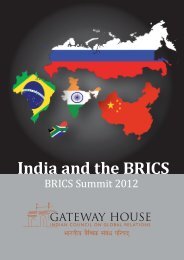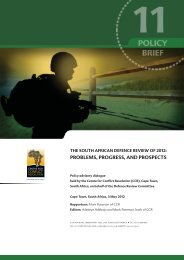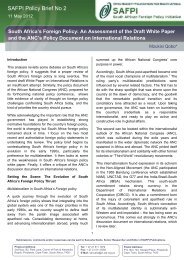Africa quarterly special on emerging powers.pdf - SAFPI
Africa quarterly special on emerging powers.pdf - SAFPI
Africa quarterly special on emerging powers.pdf - SAFPI
- No tags were found...
Create successful ePaper yourself
Turn your PDF publications into a flip-book with our unique Google optimized e-Paper software.
A F R I C A Q U A R T E R L Y■ From the Editor’s DeskEmerging Powers: A time for new dreamsIt’s a moment of unprecedented churn in globalgeo-politics, a moment that comes but rarely when anold order gives way, imperceptibly but surely, to a new<strong>on</strong>e. <str<strong>on</strong>g>Africa</str<strong>on</strong>g>, the c<strong>on</strong>tinent that was <strong>on</strong>ce superciliouslydismissed as a foredoomed place of darkness, is now not <strong>on</strong>lyshining anew, but is at the centre of a new great game ofcourtship. The rise of <strong>emerging</strong> <strong>powers</strong>, <str<strong>on</strong>g>special</str<strong>on</strong>g>ly the BRICScountries, has changed the rules of engagement, compellingthe established status quoist <strong>powers</strong> to shift their strategy in thisrecalibrated 21st century c<strong>on</strong>test for <str<strong>on</strong>g>Africa</str<strong>on</strong>g>’s resources,markets and friendship. In this arguably post-American world,marked by an inexorable shift of power from the West to therest, <str<strong>on</strong>g>Africa</str<strong>on</strong>g>, a c<strong>on</strong>tinent of around <strong>on</strong>e billi<strong>on</strong> people which isexpected to grow at a healthy 6 percent in times of thefestering euroz<strong>on</strong>e recessi<strong>on</strong>, has a unique opportunity toshepherd its renaissance <strong>on</strong> its own terms and reclaim its placein an evolving global order.The <str<strong>on</strong>g>special</str<strong>on</strong>g> editi<strong>on</strong> of <str<strong>on</strong>g>Africa</str<strong>on</strong>g> Quarterly brings together expertsand scholars cutting across c<strong>on</strong>tinents to look at the unfoldingnarrative of Afro-optimism and the implicati<strong>on</strong>s of the riseof BRICS (Brazil, Russia, India, China and South <str<strong>on</strong>g>Africa</str<strong>on</strong>g>) andother middle <strong>powers</strong> for a renascent <str<strong>on</strong>g>Africa</str<strong>on</strong>g>nc<strong>on</strong>tinent. The statistics are revelatory: the BRIC countriesstepped up their trade with the c<strong>on</strong>tinent from merely$3.5 billi<strong>on</strong> in 2000 to over $200 billi<strong>on</strong> in 2011. China hasmultiplied its trade with <str<strong>on</strong>g>Africa</str<strong>on</strong>g> from $3.5 billi<strong>on</strong> in 1990 toaround $150 billi<strong>on</strong> in 2011. India’s trade with <str<strong>on</strong>g>Africa</str<strong>on</strong>g> is estimatedto be over $50 billi<strong>on</strong>; Brazil’s trade is pegged at around$16 billi<strong>on</strong>; and Russia’s bilateral trade is around $10 billi<strong>on</strong>.While each <strong>emerging</strong> power has its own motivati<strong>on</strong>s, imperativesand even competing ambiti<strong>on</strong>s for engaging <str<strong>on</strong>g>Africa</str<strong>on</strong>g>, thereis a marked realisati<strong>on</strong> that the c<strong>on</strong>tinent is a different place andrequires new strategies to forge alternative investment anddevelopment paradigms for the c<strong>on</strong>tinent. The BRICS countriespresent a powerful challenge to the so-called Washingt<strong>on</strong>c<strong>on</strong>sensus deployed by the U.S. and traditi<strong>on</strong>al Westernd<strong>on</strong>ors and partners, some of them former col<strong>on</strong>ialists, todominate the c<strong>on</strong>tinent through the IMF-World Bank’s prescriptiveaid policies.With the unipolar moment of the American dominati<strong>on</strong>waning, new models have arisen: the so-called Beijingc<strong>on</strong>sensus, a blend of authoritarian regulated political systemand state-led ec<strong>on</strong>omic foray, and what some are seeing as the‘New Delhi model’ that is focused <strong>on</strong> a blend of capacitybuilding, human resource development, trade, aid andan <str<strong>on</strong>g>Africa</str<strong>on</strong>g>n-led c<strong>on</strong>sensus. One can also say there is a new“southern c<strong>on</strong>sensus” <strong>emerging</strong> for engaging <str<strong>on</strong>g>Africa</str<strong>on</strong>g> that isbased <strong>on</strong> the principles of South-South solidarity, whichc<strong>on</strong>trasts with the hegem<strong>on</strong>ic, prescriptive Washingt<strong>on</strong>c<strong>on</strong>sensus. Clearly, the accelerated engagement of <strong>emerging</strong><strong>powers</strong> has provided more choice of models/approaches to<str<strong>on</strong>g>Africa</str<strong>on</strong>g>, but <strong>on</strong>e also needs to look critically to find out whetherthese new players represent real choice or are basicallyrepackaging old wine in new bottle. In other words, we needto ask: are <strong>emerging</strong> <strong>powers</strong> different from traditi<strong>on</strong>al <strong>powers</strong>in any substantial way or are they neo-col<strong>on</strong>ial <strong>powers</strong> indisguise, resorting to simply packaging to differentiate/brandthemselves in <str<strong>on</strong>g>Africa</str<strong>on</strong>g> while following the same policies? In thisc<strong>on</strong>text, it is important to menti<strong>on</strong> the backlash to Chinesepolicies in some parts of <str<strong>on</strong>g>Africa</str<strong>on</strong>g>.The articles in this editi<strong>on</strong> document in great detail thetrajectory of engagement each of these <strong>emerging</strong> <strong>powers</strong> hassought with <str<strong>on</strong>g>Africa</str<strong>on</strong>g>, and provide a diversity of perspectives <strong>on</strong>the questi<strong>on</strong>s and issues that arise from their trade and diplomacyin the c<strong>on</strong>tinent. Taking an overarching view,K. Mathews argues that <str<strong>on</strong>g>Africa</str<strong>on</strong>g> must leverage its newpartnership with <strong>emerging</strong> <strong>powers</strong> in the interest of its ownl<strong>on</strong>g-term development. “<str<strong>on</strong>g>Africa</str<strong>on</strong>g>n political elites will have tobe much more cohesive at the c<strong>on</strong>tinental level if they are ableto use the competitive internati<strong>on</strong>al envir<strong>on</strong>ment to theircollective advantage. <str<strong>on</strong>g>Africa</str<strong>on</strong>g>n leaders also need to engage<strong>emerging</strong> <strong>powers</strong> more proactively in terms of <str<strong>on</strong>g>Africa</str<strong>on</strong>g>’s ownneeds, demands and aspirati<strong>on</strong>s,” he writes. In her article“The Other Powers in the C<strong>on</strong>tinent,” Sanjukta BanerjiBhattacharya c<strong>on</strong>tends that the relati<strong>on</strong>ships of the <strong>emerging</strong><strong>powers</strong> with <str<strong>on</strong>g>Africa</str<strong>on</strong>g> are being increasingly framed in thelexic<strong>on</strong> of “partnership”, be it strategic or ec<strong>on</strong>omic. In fact,she points out that the methods of these <strong>powers</strong> are now beingemulated by both the older players and the new aspirants inthe c<strong>on</strong>tinent that includes mixing trade with lucrativeinfrastructural investment and partnerships in agriculture,health, sport, educati<strong>on</strong> and technology.In a seminal sense, there is a radical shift from merelyself-interested profiteering to forging win-win and mutuallyempowering partnerships with <str<strong>on</strong>g>Africa</str<strong>on</strong>g>n countries. Paul MusiliWambua and Mumo Nzau hold India’s democracy as a modelfor an increasingly democratising c<strong>on</strong>tinent. More than 30<str<strong>on</strong>g>Africa</str<strong>on</strong>g>n states have embraced democracy and many of themhave voluntarily subjected themselves to the <str<strong>on</strong>g>Africa</str<strong>on</strong>g>n PeerReview Mechanism. The authors argue forcefully that Indiacan play a leadership role in spurring <str<strong>on</strong>g>Africa</str<strong>on</strong>g>’s <strong>on</strong>goingresurgence by helping to deepen and instituti<strong>on</strong>alisedemocratic reforms in the c<strong>on</strong>tinent.In fact, a lot is happening <strong>on</strong> the ground <strong>on</strong> this fr<strong>on</strong>t. Egyptis keen to seek India’s help in bolstering its electi<strong>on</strong>infrastructure and officials from many <str<strong>on</strong>g>Africa</str<strong>on</strong>g>n countries comeAugust 2011-January 2012 7





